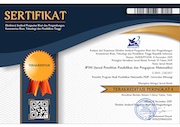Meningkatkan kemampuan penalaran matematis siswa madrasah tsanawiyah melalui penerapan model pembelajaran kooperatif tipe think pair share
Abstract
This research is an experimental study with a quantitative approach to analyse of the students reasoning ability through the application of cooperative learning model TPS. The population in this study were all students of islamic junior high schools (MTs) at the intermediate level of the 2012/2013 academic years in Tasikmalaya. The sample of this study were all students of MTs Nurul Falah taken randomly, and class VIII-B was chosen consisted of 35 students as experimental class and class VIII-C as control class. The instrument used in this study was included the ability of mathematical reasoning test. The analysis of the data used two different average test and ANOVA test using two lines of General Linear Model Univariate Analysis. Based on the results of this study, it has been found that (1) The improvement of reasoning ability and problem-solving ability of students who learned mathematic using cooperative model is better than those who learn mathematic using conventional model, (2) there are improvement differencies of reasoning ability and mathematical problem solving between the students who learn mathematic using cooperative learning model TPS type and students who learn mathematic using conventional model in terms of high-level capabilities, medium, and low, and (3) there is an interaction between learning and mathematical prior knowledge of students group (high, medium, low) in reasoning ability.
Full Text:
view PDFReferences
Dahlan, J. A. (2004). Meningkatkan kemampuan penalaran dan pemahaman matematik siswa sekolah menengah lanjutan pertama melalui pendekatan pembelajaran Open-Ended. Desertasi Sekolah Pascasarjana Universitas Pendidikan Indonesia. Bandung.
Filsaime, D. K. (2008). Menguak Rahasia Berpikir Kritis dan Kreatif. Jakarta: Prestasi Pustaka.
Isjoni. (2010). Cooperative Learning Efektifitas Pembelajaran Kelompok. Bandung: Alfabeta.
Lie, A. (2008). Mempraktikan Cooperative Learning di Ruang-ruang Kelas. Jakarta: PT Grasindo.
Priatna, N. (2003). Kemampuan penalaran dan pemahaman matematika siswa kelas 3 Sekolah Lanjutan Tingkat Pertama Negeri di Kota Bandung. Desertasi Sekolah Pascasarjana Universitas Pendidikan Indonesia. Bandung.
Shadiq, F. (2004). Penalaran, pemecahan masalah, dan komunikasi dalam pembelajaran matematika. Makalah disajikan pada Diklat Instruktur Matematika SMP Jenjang Dasar, 10–23 Oktober 2004. Yogyakarta: Dirjen Dikdasmen PPPG Matematika.
Siregar, N. (2009). Studi Perbandingan Kemampuan Penalaran Matematik Siswa Madrasah Tsanawiyah pada Kelas yang Belajar Geometri Berbantuan Geometer’s Sketchpad dengan Siswa yang Belajar Geometri tanpa Geometer’s Sketchpad. Tesis Sekolah Pascasarjana Universitas Pendidikan Indonesia. Bandung.
Sumarmo, U. (2010). Berfikir dan Disposisi Matematik: Apa, Mengapa, dan Bagaimana Dikembangkan pada Siswa. Bandung: FPMIPA UPI
Tarim, K., Akdeniz, F. (2007). The Effects of Cooperative Learning on Turkish Elementary Students’ Mathematics Achievement and Attitude Towards Mathematics using TAI and STAD Methods. Journal Educ Stud Math (2008) 67: 77–91.
Trianto. (2011). Model-model Pembelajaran Inovatif Berorientasi Konstruktivistik. Jakarta: Prestasi Pustaka Publisher.
Wahyudin. (1999). Kemampuan Guru Matematika, Calon Guru Matematika, dan Siswa dalam Pelajaran Matematika. Disertasi IKIP Bandung. Bandung: Tidak Diterbitkan.
DOI: https://doi.org/10.37058/jp3m.v1i1.140
Refbacks
- There are currently no refbacks.
©2017 JP3M (Jurnal Penelitian Pendidikan dan Pengajaran Matematika)
Program Studi Pendidikan Matematika
Fakultas Keguruan dan Ilmu PendidikanÂ
Universitas Siliwangi
Jl. Siliwangi No. 24 Kota Tasikmalaya - 46115
email: jp3m@unsil.ac.id
e-ISSN: 2581-2807 ; p-ISSN: 2460-8599

This work is licensed under a Creative Commons Attribution-NonCommercial-ShareAlike 4.0 International License.
StatCounter:
Detail


